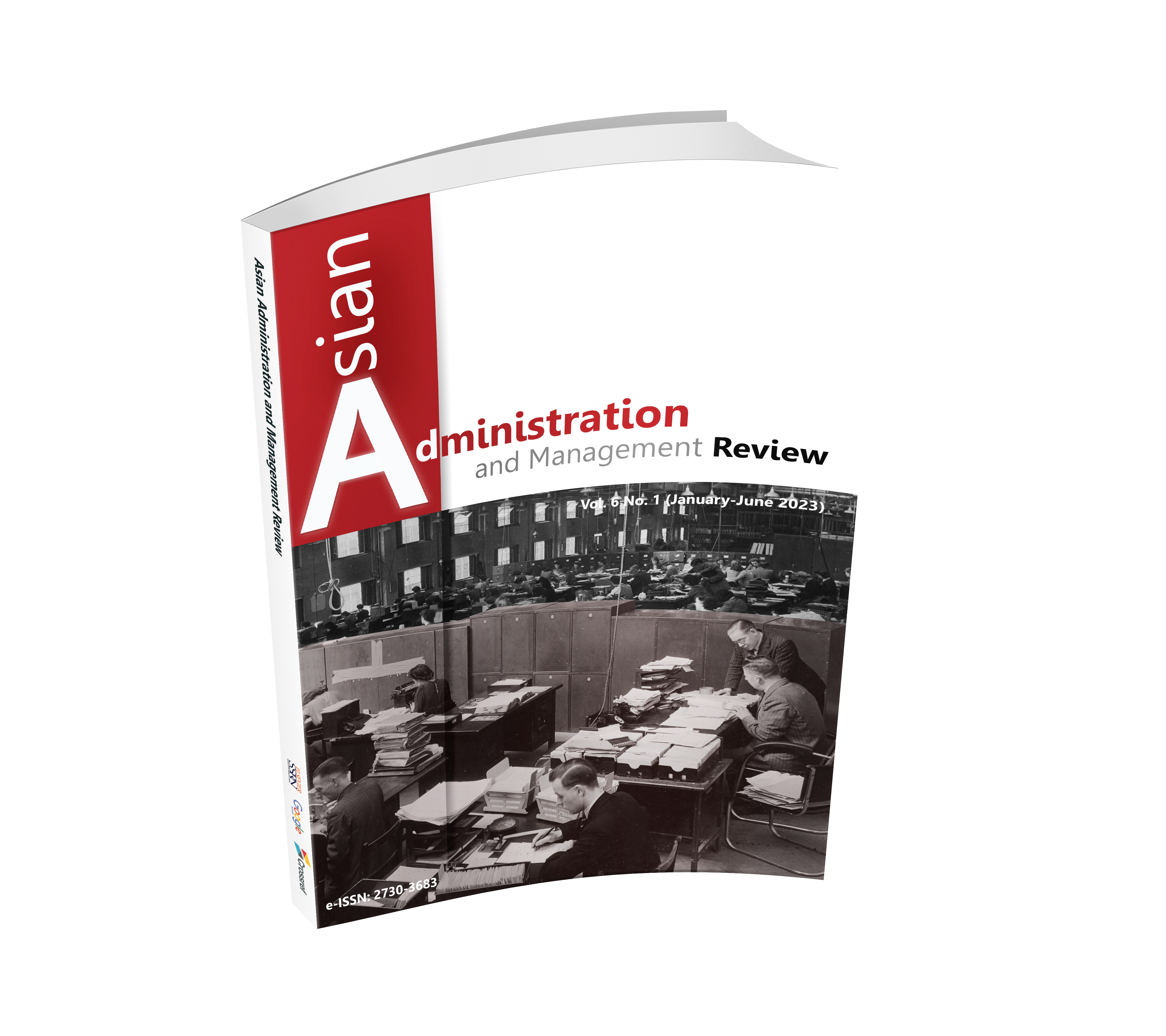DEVELOPMENT OF HEALTHY FOOD RECIPES FROM LOCAL WISDOM WITH AN ENVIRONMENTALLY CONSERVATIVE PROCESS TO PROMOTE GASTRONOMY TOURISM
DOI:
https://doi.org/10.14456/aamr.2023.2Keywords:
Healthy Food Recipe, Local Wisdom, Environmental Conservation, Gastronomy Tourism, Ayutthaya ProvinceAbstract
This research aimed to study food wisdom and develop healthy food recipes from local wisdom using the environmentally conservative process to promote gastronomy tourism in Ko Koet Community, Ayutthaya Province. The mixed research method was applied using the participatory action and experimental research approaches. Two healthy food recipes to promote gastronomy tourism in Ko Koet Community, Ayutthaya Province were Tom Yum Kung Maenam and Kang Liang Kung, which were the identity of the region. Both recipes were healthy food initiated from local wisdom with the environmentally conservative process accepted by consumers. The level of acceptance was moderate to high. Analysis results indicated that nutritive value of Tom Yum Kung Maenam included 6.81% of protein, 2.46% of carbohydrate, 0.80% of fat, and 0.24% of fiber. Meanwhile, the nutritional value of Kang Liang Kung contained 10.54% of protein, 5.49% of carbohydrates, 1.34% of fat, and 1.54% of fiber. Both menus were healthy food with a nutritional balance created based on local wisdom using the environmentally conservative process and appropriate for promoting the gastronomy tourism of Ko Koet Community, Ayutthaya Province.
Downloads
References
Anuntatanachai, R., Kittiwaraphon, T., Kulsetthanchalee, C., Onvimol, N., Khansi, A., & Jarupran, K. (2010). Development of Healthy Thai Food Set Menus based on the Sufficiency Economy Philosophy and Community Context. SDU Research Journal Science and Technology, 3(1), 59-74.
Association of Official Analytical Chemists. (2000). Official Methods of Analysis of the Association of Official Analytical Chemists. 15th ed. Virginia: Association of Official Analytical Chemists, Inc.
Charoenkiatkul, S., Kosulwat, V., Chavasit, V., Kosulwat, S., Rojroongwasinkul, N., & Boonpraderm, A. (2003). Nutritive Values of Healthy Thai Foods. Bangkok: National Research Council of Thailand.
Du Rand, G., Heath, E., & Alberts, N. (2003). The Role of Local and Regional Food in Destination Marketing: A South African Situation Analysis. Journal of Travel & Tourism Marketing, 14(3), 97-112.
Egkantrong, P., Banjong, O., Tamachotiopng, S., Boonpraderm, A., & Charoonruk, G. (2010). Developing Local Recipes for the Elderly. Journal of Health Systems Research, 4(2), 249-256.
Gheorghe, G., Tudorache, P., & Nistoreanu, P. (2014). Gastronomic tourism, a new trend for contemporary tourism?. Cactus Tourism Journal, 9(1), 12-21.
Gogoski, R., & Cuculeski, V. (2019). Gastronomic tourism, creative economy and possibilityfor economic development. A paper presented at the 13th Symposium with international participation "Novel Technologies and Economic Development”, Leskovac, Serbia.
Herforth, A. (2010). Promotion of Traditional African Vegetables in Kenya and Tanzania: A Case Study of an Intervention Representing Emerging Imperatives in Global Nutrition. Doctor of Philosophy Thesis, Cornell University.
Jainan, A., Thanyakit, S., & Suanpang, P. (2022). The development of Kanom Hin Fon Thong product for health. International Journal of Health Sciences, 6(S1), 10871-10887.
Klinjandang, K., & Dabphet, S. (2020). The development of Gastronomy Tourism Desination with the uniqueness of Local Food. NRRU Community Research Journal, 15(3), 144-157.
Koograsang, A., Karnjanakit, S., & Sukonthasab, S. (2019). The Gastronomic Creative Tourism Management Guidelines: Dating Back to the Past, Gastronomy along the Laos Vientiane Migration Route in Northeast Thailand. PSAKU International Journal of Interdisciplinary Research, 8(Special Issue), 80-88.
Kosulwat, S., Prasertwaree, R., Kosulwat, V., Charoenkiatkul, S., & Rojroongwasinkul, N. (2005). Phytochemicals in Thai Food. Academic Conference “Thai Food Determination and Modification Towards World Kitchen and Disease Kitchen: From Knowledge to Practice”. A paper presented at the Thai Dietetic Association and Faculty of Medicine Ramathibodi Hospital Mahidol University, 12-15 May 2005.
Laurujisawat, P. (2013). Direction of Healthy Food from ASEAN to the World Stage. Khon Kaen: Khon Kaen University.
Phongpit, S. (1986). Back to the Root: Alternatives and Criticism on Local Wisdom. Bangkok: Tianwan.
Singsomboon, T. (2014). Marketing Strategies for Thai Gastronomic Tourism Promotion. Doctor of Philosophy Thesis, National Institute of Development Administration.
Sopa, J., Suanpang, P., Jainan, A., Duangjit, J., Rodprasert, P., Webb, P., Netawong, T., & Anmanee, A. (2022). Enhancing Creative Tourism in Ayutthaya Gastronomy the Port City of the East. Bangkok: Thailand Science Research and Innovation.
Suanpang, P., Sopa, J., Jainan, A., Thanyakit, S., Chuamsompong, B., & Arnmanee, A. (2022). Penetrating for a Prototype of Food Culture and Developing Food Decks in Ayutthaya Gastronomy the Port City of the East. Bangkok: Thailand Science Research and Innovation.
Suphaphiphat, W. (2016). To Know About Health. Bangkok: Pimdee Printing.
Tansakul, P. (2020). Guidelines to Promoting Local Cuisine for Gastronomic Tourism: Case study of Khanab Nak Community, Pak Phanang District, Nakhon Si Thammarat Province. WMS Journal of Management, 9(1), 81-92.
Wongarun, W. (2019). Food Product Processing from Household Waste of Jackfruit Seeds in Nhong Plai Tang Community, Rai Kao District, Sam Roi Yod, Prachuap Khiri Khan. EAU Heritage Journal Science and Technology, 13(2), 132-144.

Downloads
Published
How to Cite
Issue
Section
License
Copyright (c) 2023 Authors

This work is licensed under a Creative Commons Attribution-NonCommercial-NoDerivatives 4.0 International License.











.png)


